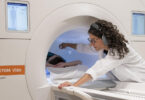For the more than one hundred physiotherapists and rehab assistants embedded at each of Providence Health Care’s sites, the global pandemic has completely transformed how they help get patients, residents and clients back on the move. That includes those who are most critically ill with COVID-19.
Physiotherapy is, by its nature, a hands-on job – supporting, positioning, stretching, retraining and strengthening the body. Moving and strengthening the body is vital during the recovery process, whether rehabilitating from an illness or an injury.
Ellen Woo and Andrea Neufeld are physiotherapists who work in the Intensive Care Unit (ICU) at St. Paul’s Hospital. Despite patients in the ICU often being ventilated or sedated, physiotherapists are involved right from the beginning of a patient’s admission to hospital.
“We screen patients within a day or two of admission to ICU,” says Ellen. “If appropriate, assessment and treatment begin immediately. We work as a team, communicating directly with doctors and nurses to identify potential needs for physiotherapy.”
A complex illness
The COVID-19 patients who are admitted to ICU are critically ill, often with multisystem involvement. Their low respiratory endurance affects their ability to breathe and clear secretions out of their lungs. Due to days, or sometimes weeks, spent in bed, many COVID patients suffer from muscle weakness, deconditioning and sometimes neurological deficits.
In the early days of an ICU admission for COVID, the physiotherapist’s goals of care are generally focused on improving the patient’s respiratory status and secretion clearance, which include adjusting a patient’s positioning to optimize respiratory function; however, the focus is not limited to helping breathing. Physios also guide staff in positions and stretches to prevent contractures and in identifying opportunities for early mobilization. Even when patients require mechanical ventilation, physios still assist them to stand, walk, and sit up in chairs.
But just as an individual patient’s response to the virus varies, so too does their treatment and the approach to care. “It’s dependent on factors such as the level of sedation and the patient’s prior function,” says Andrea. “They may have delirium affecting their ability to participate in exercise sessions. Even with minimal exertion, we may see a drop in their oxygen saturation and difficulty performing basic exercises.”
Keeping the connection
With every interaction happening behind a mask and goggles, extra steps need to be taken to help build rapport and trust. “The personal protective equipment required for COVID patients creates an unusual barrier in the relationship between a therapist and patient”, says Ellen. “We often use smiles and other facial expressions to help communicate and interact with patients in the ICU. But with COVID, it is hard to come across as calming and reassuring when all patients see is an individual covered head to toe in protective equipment.”

To build and maintain connections with COVID patients, Ellen and Andrea have developed new protocols – spending extra time with them whenever possible, holding the hands of ventilated patients unable to speak, or talking to a patient about their family or their hobbies once they are able to communicate. Physiotherapists also help facilitate videoconferences between patients and families by positioning patients in an upright position.
Increased communication has also been an essential factor in the smooth operations within the larger ICU team. “Caring for COVID patients requires extra communication and coordination within the ICU team,” says Ellen. “We plan things like coordinating a physiotherapy intervention to coincide with certain nursing care in order to limit exposure and PPE use. Normally, we only have one physiotherapist in our ICU, but we made the decision to have two staff members during the height of the crisis to not only help with increased patient needs, but also to provide support for each other.”
Getting through it together
For a close-knit team that considered themselves like family even before COVID-19 came to St. Paul’s, the importance of doing daily check-ins and having open communication between co-workers has never been so crucial. So, too, was celebrating the victories of those who are winning their battle against COVID-19.
“We always celebrate the accomplishments of each of our patients,” says Andrea. “Everything from a simple thumbs-up from a ventilated patient to seeing a patient stand for the first time.”
“We know that whatever the COVID pandemic throws at us, we will get through it together,” says Ellen.

May is National Physiotherapy Month! Thank you for helping Canada recover.





